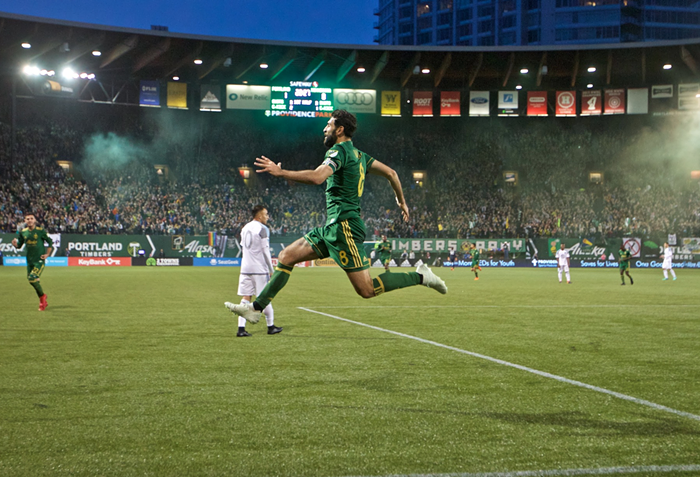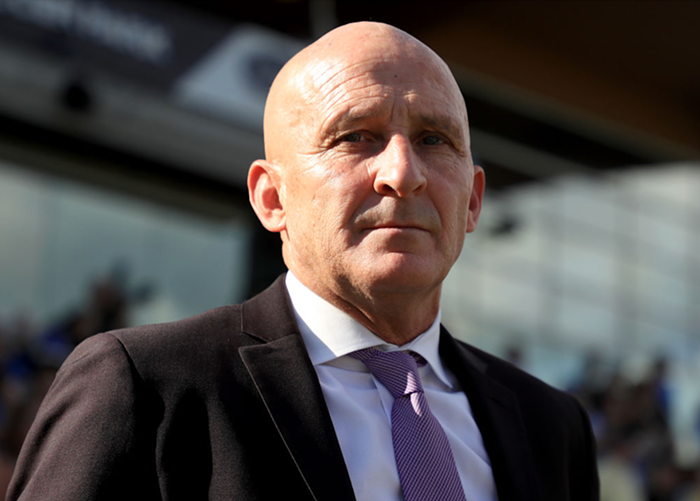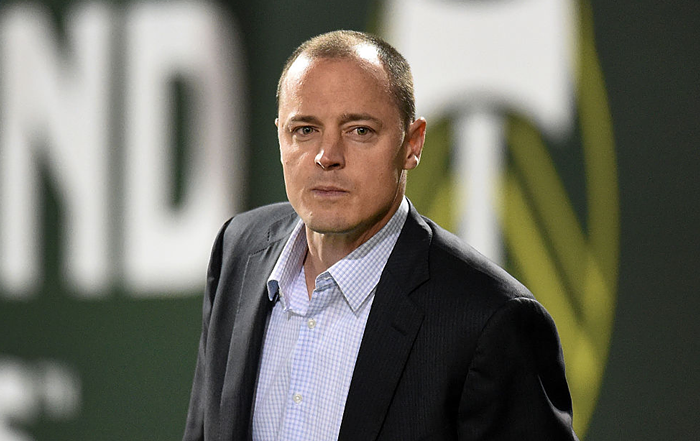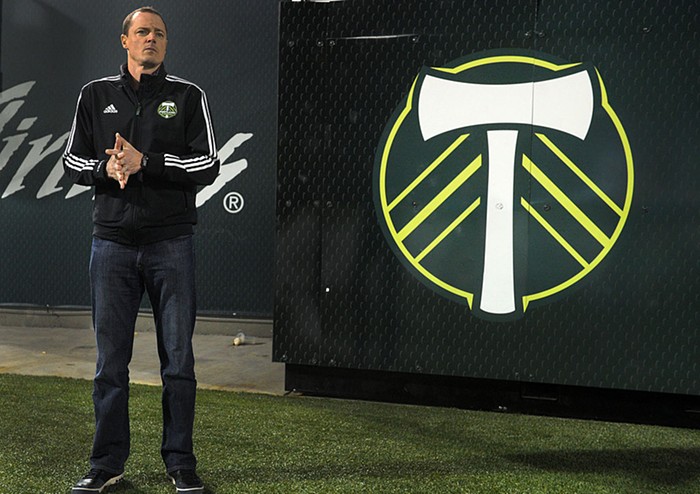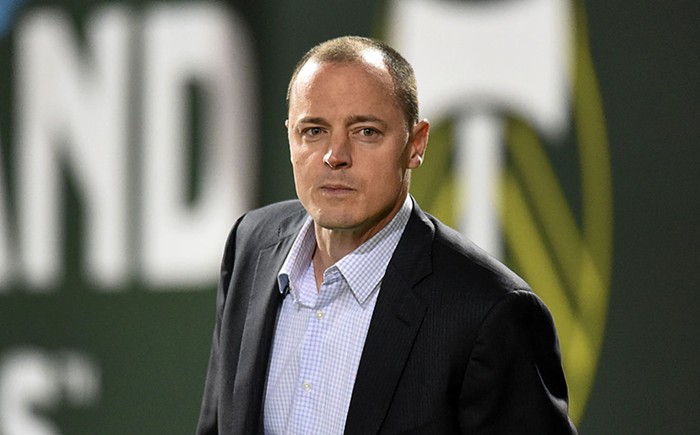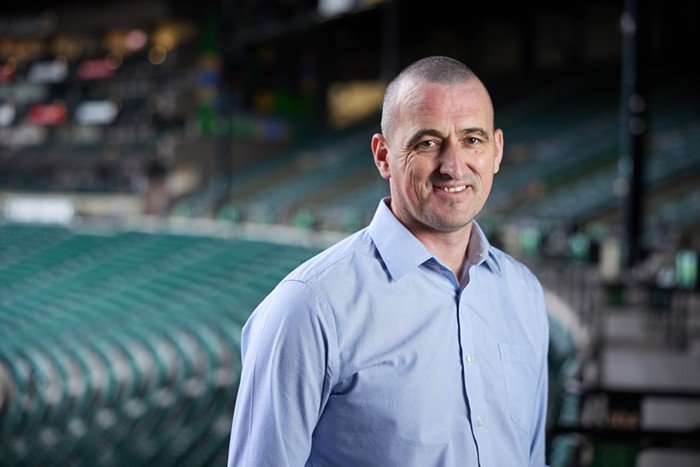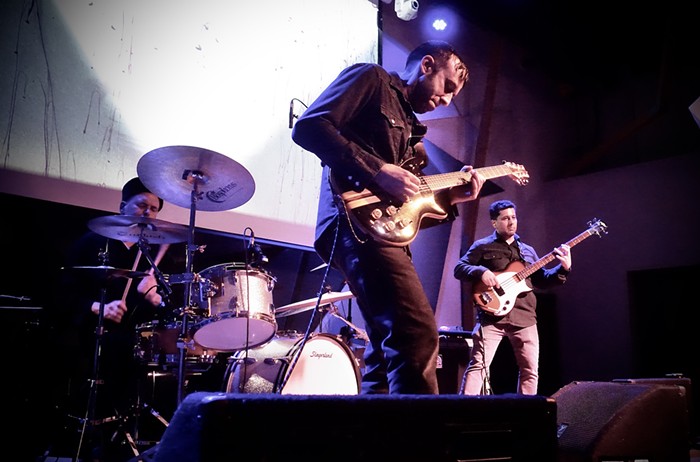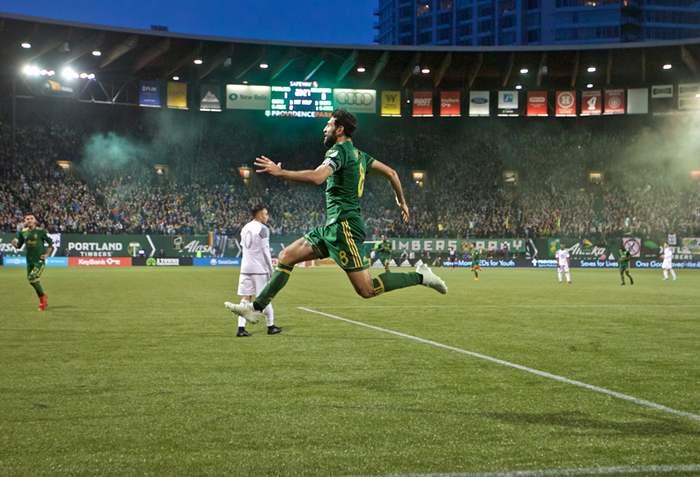
We’ll start with a soccer story.
Diego Valeri’s nine years in Portland were about much more than soccer, but this goal in March, 2013, all the way back at the beginning, is as natural an entry point as any. It was one of the first signs that Valeri was about to change the trajectory of Timbers soccer forever—that the club’s history was going to someday be divisible by "Before and After" Valeri eras.
It was opening day at Jeld-Wen Field, and the Timbers, having struggled mightily through their first two MLS seasons, were already trailing the New York Red Bulls 1-0 in the fourteenth minute when Valeri received a pass on the top of the New York box.
With a defender rushing out to meet him, Valeri dinked the ball onto his opposite foot past the Red Bulls center back, chested it forward, and then, with the outside of his foot, spun it past New York goalkeeper Luis Robles into the far corner of the net to tie the game.
“Everyone on the field was like ‘What the fuck did I just see? Oh my god,” Shawn Levy, an author and longtime member of the Timbers Army, said.
That reaction would be repeated time and time and time again over the next nine years as this Argentinian midfielder from Lanús dazzled MLS and cemented his place in the hearts of Timbers fans with his consummate class and embrace of everything that sets the Portland soccer community apart.
“[He was] the finest player, the finest person, the finest Portlander,” Levy said. “It’s just incalculable what he’s done here.”
Yesterday the Timbers announced that Valeri is returning to Lanús—leaving one home to go back to another. He will presumably finish his playing career with his boyhood club and become a Timbers ambassador when he retires, but not before the two clubs play a testimonial match at Providence Park to honor Valeri in 2023, with the midfielder playing one half for each team.
That Valeri is not retiring as a Timber is a source of sadness and frustration for supporters who presently have no shortage of frustrations with the club’s leadership. Valeri’s relationship with the club had been strained for some time, and his exit, not entirely, if at all, on his terms, is a shame.
The Timbers may just miss Valeri’s still very-present quality on the field more than they realize. They will certainly miss the person who arrived in Portland as a 26-year-old, a young father compelled to leave Argentina after being robbed at gunpoint outside his home, and is departing as a 35-year-old center of gravity in the city he quickly adopted as his own.
Even in advance of his move to Portland, Valeri threw himself into learning English and was fully conversant in his new language not long after his arrival. He threw himself into community work with similar urgency.
Levy is on the board of Operation Pitch Invasion (OPI), a not-for-profit organization that builds soccer and futsal pitches in parks and at schools around the area, and Valeri quickly began to support the organization’s work—attending fundraisers and ribbon cuttings on its behalf.
“The team is very particular about player appearances, [and] some of these things are contractual,” Levy said. “They’re contracted with the players’ union that players only need to make three personal appearances per year, and when they do that they are escorted by a representative of the team. Diego would just show up.”
“We’d get feedback from the team saying, ‘What is Diego Valeri doing there?’” Levy continued. ‘And we’d be like, ‘Dude showed up! What were we supposed to do? Turn him away?’”
This wasn’t a unique experience.
“They’re the real deal,” supporter Keith Palau said of Valeri and his wife Florencia. “You won't hear anyone, I’m sure, say otherwise. They’re 'what you see is what you get' people—and not everyone in life is that way, athlete or not, famous or not.”
In 2016, Palau tweeted that he was raising money for a project to give Timbers and Thorns-themed makeovers to family visitation rooms for foster children in Oregon Department of Human Services buildings around the metro area.
Valeri immediately donated to the project, but he also asked Palau how he and his family could help more practically.
“I thought that it was gracious to say that—and people say things like that, but don’t always follow through,” Palau said. “So I was thankful and stayed in touch, but really didn’t expect them to do what they did.”
Weeks later, Valeri and Florencia were putting together an Ikea bookshelf on a volunteer shift in the room. He remained a committed volunteer and ambassador for the project as Palau led the renovations of three more family visitation rooms in the years to follow.
This is not hagiography for a departing legend. For every one of these stories about Valeri’s commitment to Portland there is space to tell, there are countless more that will go untold—about the time he and his daughter helped paint a Timbers Army tifo before a game against Seattle, or the many charitable donations, from log slabs to jerseys to soccer balls, that he often kept quiet.
Valeri’s vocal support of the Thorns, whose expansion season coincided with his arrival in Portland, was extremely significant. He frequently attended games with his daughter Constanza and wore a Lindsay Horan jersey after the Thorns midfielder won the NWSL’s MVP award in 2017.
Valeri was one of those people who showed up—the mark, as Anis Mojgani wrote in his MLS Cup poem last month, of a true Portlander. On the field, off the field, in front of the cameras, and very far away from them.
Valeri’s soccer life will continue for at least another year. But his life beyond soccer, which may at some point bring him back to Portland, promises to be very interesting too.
Valeri plays music and reads widely—including Levy’s most recent book of poetry, which he tweeted a picture of in November. He and Palau often talk about theology and spirituality. He is a publicly committed and loving father. He doesn’t drink, smoke, or swear.
“They called him Saint Valeri on the team plane,” Levy said. “He was too good to be true.”
Over the years, the Timbers Army tried in many ways to express a commensurate level of affection. In 2015, the Army hung a banner in the North End that featured an image of Valeri next to the word “TROESMA”—which means, roughly, in Buenos Aires slang, “The King.” Swap the first and last syllables of the word, and you get MAESTRO, Valeri’s other nickname.
They were fitting tributes. Valeri saw the game so quickly and clearly and played it with such verve and panache. He was the kind of player you can spend decades dreaming about your team having, and then to have him show up, and to be able to enjoy him for so long—it was all a blessing.
Nothing that has happened in the last year, from his mid-season benching to his heartbreaking missed penalty in MLS Cup, his last game in Portland, changes any of that.
“I hope to see them in our community for years to come,” Levy said of the Valeris. “I hope that whatever this experience of separation from Portland and the Timbers is like, that it can be healed, and we can celebrate again.”
